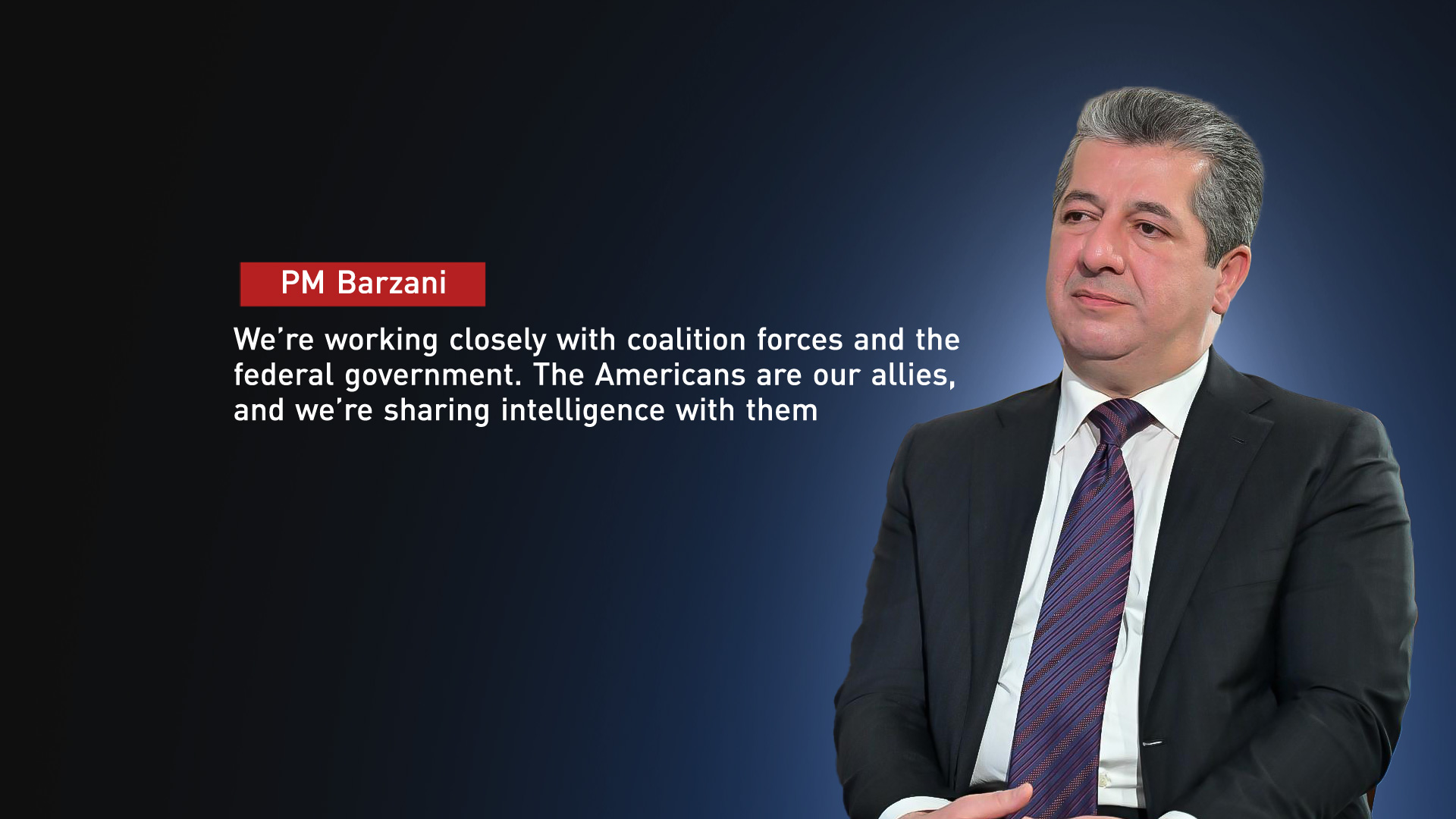PM Barzani Urges Cooperation, Stability in Wake of Attacks on Kurdistan Region Oil Fields
The Prime Minister confirmed that investigations are underway to determine those responsible for the recent drone strikes on the Kurdistan Region’s oil fields. “We have some information, but I’d rather wait until the relevant authorities release their conclusions,” he stated.

ERBIL (Kurdistan24) – Kurdistan Region Prime Minister Masrour Barzani, in an exclusive interview with Asharq News on Sunday, emphasized the need for unity, regional cooperation, and continued reform amid ongoing drone attacks targeting oil infrastructure and persistent political challenges.
The Prime Minister confirmed that investigations are underway to determine those responsible for the recent drone strikes on the Kurdistan Region’s oil fields. “We have some information, but I’d rather wait until the relevant authorities release their conclusions,” he stated. While hinting at a clear understanding of the perpetrators, Barzani refrained from disclosing further details pending the final results of the investigation.
The Prime Minister stressed that the timing of the attacks may be linked to recent energy agreements signed with American companies, though he cautioned against drawing premature conclusions. “We’re working closely with coalition forces and the federal government. The Americans are our allies, and we’re sharing intelligence with them,” he said.
Highlighting the Kurdistan Region’s relative stability in a turbulent region, Barzani reaffirmed that security remains a top priority. “There are still ISIS sleeper cells in parts of Iraq and Syria, though not in the Kurdistan Region. We continue working with our allies to ensure ISIS does not regain strength,” he warned.
On broader political developments, Barzani expressed support for Turkey’s peace initiative and Kurdistan Workers' Party (PKK) leader Abdullah Ocalan’s call for disarmament. “This is a positive step. Over 800 villages in the Kurdistan Region remain uninhabited due to ongoing conflict. We hope displaced residents can return if this process succeeds,” he said.
Turning to governance, Barzani noted that discussions are ongoing between the Kurdistan Democratic Party (KDP) and the Patriotic Union of Kurdistan (PUK) regarding the formation of the next cabinet. He expressed hope that a new government would be formed ahead of Iraq’s national elections. “We’ve agreed on the agenda for the next government, which will be the continuation of the current cabinet that we have,” he confirmed.
Barzani also addressed Baghdad-Erbil relations, emphasizing the need for a fair oil and gas law to resolve long-standing disputes. “The law is outdated and doesn’t reflect a federal Iraq. We were ready to pass it in 2007. The delay lies with Baghdad,” he asserted.
He voiced concern over the politicization of public sector salaries in the Kurdistan Region. “Delays in salary payments are unconstitutional. These are not technical issues but political decisions aimed at pressuring the Kurdistan Region,” Barzani said, citing disparities in hiring and welfare distribution across Iraq.
Regarding the Iraqi presidency, held by a Kurd, Barzani noted its symbolic importance. “It reflects Iraq’s diversity. We hope this tradition continues to acknowledge the Kurdish role in Iraq’s unity.”
Barzani commented on the stalled oil exports via the Iraq-Turkey Pipeline, attributing the suspension to a French court ruling rather than any Turkish decision. With the agreement set to expire in 2026, he suggested that renegotiations may be needed.
On Article 140 of the Iraqi Constitution concerning disputed territories, Barzani stressed that progress is hindered by a lack of political will in Baghdad. “There’s a constitutional roadmap, but demographic manipulation and harassment continue. Without political will, there is no implementation,” he said.
Barzani outlined key reforms in electricity, water infrastructure, and digital services, noting that cities like Erbil, Sulaimani, and Duhok now enjoy 24-hour electricity. A new water project will meet Erbil’s needs for the next 30 years, he added.
Discussing regional diplomacy, Barzani reaffirmed strong ties with Saudi Arabia, inviting Saudi investment in the Kurdistan Region and expressing interest in reciprocal economic engagement. He also underscored improved relations with Turkey, noting non-interference in domestic politics despite border tensions related to the PKK.
On Iran, Barzani acknowledged the importance of good relations and rejected accusations that the Kurdistan Region threatens Iranian security. “We’ve always respected our neighbors. We’ve never been part of any conspiracy,” he stated.
Barzani reiterated the Kurdistan Region’s support for dialogue among Syrian Kurdish factions and the Syrian government, facilitated by President Masoud Barzani’s earlier mediation efforts.
Regarding the Kurdistan Region’s strategic outlook, Barzani said, “We aim to become an economic hub for all of Iraq. We have the resources, institutions, and vision to achieve this. Cooperation is more beneficial than obstruction.”
He affirmed the Region’s constitutional right to sign energy contracts independently, noting past legal victories affirming this right. “There are no legal obstacles to signing new contracts with interested companies,” he said.
On foreign relations, Barzani expressed gratitude for continued U.S. support, particularly during the war against ISIS, and voiced hope for an even deeper partnership moving forward.
Barzani concluded with a strong message of peace amid escalating regional tensions. “We do not want war. Any conflict in the region affects us all. We are not part of it, but caught in the middle. We hope peace and dialogue will prevail.”